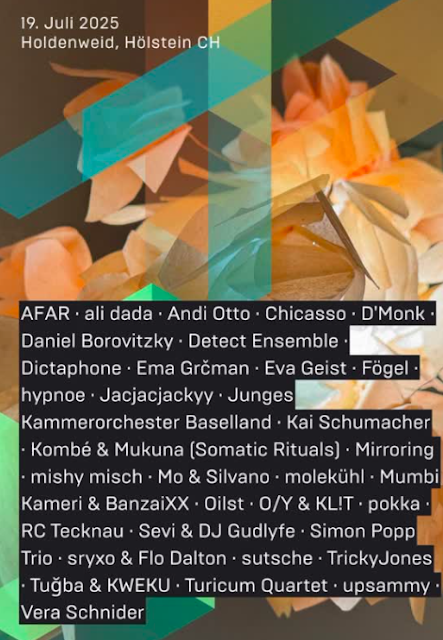This summer, the Between Mountains Festival makes its debut on 19 July at Holdenweid in Hölstein, Switzerland. More than just another music festival, Between Mountains seeks to redefine how classical music is presented and experienced by bringing it into conversation with electronic, ambient, and experimental genres. Set against the unique backdrop of a former psychiatric facility turned cultural centre at the foothills of the Jura Mountains, the festival appeals to curious audiences interested in a different classical musical experience.
The festival is the vision of conductor Baldur Brönnimann and cultural manager Felix Heri. Longtime collaborators with a shared mission to challenge traditional classical concert formats, Baldur and Felix have created Between Mountains to bridge divides – between genres, audiences, and generations – and to foster a new kind of musical community in Switzerland. Drawing inspiration from Germany’s Detect Classic Festival, they have tailored this project to resonate with local artists and listeners while maintaining a spirit of experimentation and openness.
In this interview, we speak with Baldur Brönnimann and Felix Heri about the origins of the festival, their ambitions for changing classical music’s cultural landscape, and how Between Mountains invites audiences to encounter music in unexpected ways.
How did the idea for Between Mountains Festival first come about? What inspired you to create a new kind of music gathering in Switzerland?
Baldur & Felix: We worked together for years, sharing the philosophy of breaking up the classical music concert formats and bringing them in tune with 21st-century audiences and 21st-century listening habits. We worked together as a chief exec and as a principal conductor at Basel Sinfonietta, and from that time, we always tried to present classical music in unexpected and non-traditional ways, because we felt that the format often stood in the way of establishing a direct relationship between the listener and the music.
Baldur: In 2021, I worked at the Detect Festival in Germany with the Junge Norddeutsche Philharmonie, and I thought this festival was really an interesting concept. It was a festival that had a younger audience who were looking for a great musical experience without the formalities of a traditional classical concert.
Then, when I won the culture prize of Baselland in 2023, we started to talk to the region about starting a new classical event for new audiences. And there was a political interest. That’s when we first had the idea to bring the concept of Detect to Switzerland. We looked at several locations, but finally, Holstein was the ideal place to try and make our first festival work.
How would you describe the identity of Between Mountains in relation to Germany’s Detect Classic Festival? In what ways is it connected, and how does it stand on its own?
Baldur & Felix: A key concept of the Between Mountain festivals is the aspect of not just staging an annual event, but creating a festival that leaves a trace in the region. Something that helps the local musical ecosystem. We give young Swiss artists a platform. We work with a young local chamber orchestra and hope to help the group to grow and to create something sustainable during the year, beyond the weekend of the festival itself. We hope “Between Mountains” will be a constructive factor in the musical landscape around Basel, create a certain identification and resonance with the local collectives. And we want to give the local artists a platform for their artistic future.
The name Between Mountains feels both literal and symbolic. How did you arrive at it? Is it purely geographical, or does it reflect a deeper aspect of the festival’s vision?
Baldur & Felix: Switzerland is one of the countries with the highest density of music festivals in the world. But we wanted to give this festival a completely different feel, because we felt that many classical music festivals cater to a traditional classical audience, and that there is a young, curious public that wouldn’t go to Gstaad, Lucerne, or Verbier, because they want a different musical and live experience.
On the one hand, Between Mountains is obviously kind of a geographic definition. It’s outdoors, it’s in Switzerland, etc. But it’s also something symbolic, because as a Swiss, one knows that one can always climb up the mountains, but one has to come down again. So in between the mountains, that’s where the people are. And that’s where we wanted to be with our festival.
You’ve mentioned that Between Mountains aims to “break down barriers around classical music and redefine how it’s experienced”. What specific barriers do you identify, and how is the festival designed to dismantle them?
Baldur: I’ve been working for 25 years professionally in the field of classical music. And I realize that there is a gap between the interest in classical music and the audience that really comes to concerts.
Between 20 or 30 percent of people on Spotify will listen to some sort of classical music at some stage, or will have classical music as part of their listening habits. But just maybe one or two percent of the audience will ever go to a live classical concert. So this obviously tells us that there is something in the concert format that we have to think about.
I never heard anybody say that they don’t like Mozart or they don’t like Rossini or Philip Glass. But some people don’t. They feel that the traditional concert format is not right for them. That is partly down to a history of artificial, elitist, and academic barriers that go on even today, and that keep people from experiencing classical music in a democratic, friendly, and stimulating way.
And these are the kinds of barriers that we wanted to eliminate. What one calls tradition, very often in classical music, has changed a lot over the years. At the beginning of the 19th century, many orchestras used to play standing up, conductors used to face the audience. People used to clap whenever. Sometimes people would eat and drink during concerts. And these rules changed over time, again and again and again, because of changing social conventions and listening habits.
But Felix and I felt that, in 21st-century classical music, we’re still very much stuck in the past: sometimes unintelligible program texts, unquestioned rules and codes in classical concerts, or just simply a feeling of not belonging.
We wanted to create an alternative way people can encounter classical music: in unexpected places, in the middle of the night, in a forest, sharing the experience with friends and blurring the boundaries between life and musical experience.
Given the diversity of genres in the program, how do you define classical music within the context of Between Mountains? Are you trying to expand its definition, or is it more about presenting it in new and unexpected ways?
Baldur & Felix: What we’re looking for is presenting music in new and unexpected ways. What we present is… the best historic and new music. We play Mozart, Grieg, Haydn, but also music by living composers, 20th-century music, 21st-century music. But what is really different is the way it’s being presented. We short-circuit the traditional classical music format and bring the great classical masters in touch with other musical genres.
How do you approach selecting classical musicians for the festival? What qualities or approaches do you look for in artists?
Baldur & Felix: We select artists from the target group of our audiences because we want to create this identification with classical artists. We also select artists that have a wider interest than maybe some more traditionally focused artists. So we look for people who would fit with and understand the concept of “Between Mountains.” And we also look for people who have a broad aesthetic horizon, who are interested in looking further than the standard repertoire and have an unmistakable artistic profile. And of course, we look for local artists because we want to make sure they create this identity of the festival.
Do you see the electronic and experimental artists on the line-up acting as a gateway for new audiences to discover or re-engage with classical music? How do you facilitate that cross-genre discovery within the festival?
Baldur & Felix: The classical and electronic artists that we present share a common trait: they explore the boundaries of their musical genres. They are eager to expand, curious, sometimes experimental, and they cater to a musically diverse audience. That’s where I feel classical music and other genres like electronic music have a synergy: they share a similar audience.
We want to send the message that if you want to hear interesting music, then “Between Mountains” is the place to be, because you’ll experience great artists and great music, regardless of the genre. In that sense, we alternate electronic and classical acts in a completely spontaneous way, aiming for people to make absolutely no distinction between the kinds of music they listen to, but simply experience it as one unified event.
A former psychiatric facility transformed into a creative sanctuary is quite a unique setting for a festival. How did you discover Holdenweid, and what initially drew you to this particular estate as the home for Between Mountains?
Baldur & Felix: We were looking for an unusual venue, first of all, one that would give us the possibility to play both outdoors and indoors, and also something completely off the beaten track. We found that we had a lot in common with the people who are converting the old psychiatric facility in Hölstein into a cultural centre, because we share many values regarding sustainability, transformation, respecting the environment, etc.
We visited several venues, but Holdenweide was special. With the ideas of the people behind the transformation of Holdenweide, we could create something meaningful together. We were looking for a partner, and they understood what we had in mind with Between Mountains. There was a basic understanding from the very beginning. That’s how this festival ultimately ended up here.
What would you tell a classical music lover who’s hesitant about electronic music to encourage them to come?
Baldur & Felix: We would say, if you’re interested in good music, you should come to Holdenweide. It is not just the music itself; you will share this moment with many other people who are curious listeners and who also want a slightly different experience. If you like to be surprised and are open to new musical and aesthetic experiences, “Between Mountains” is the place to go.
Between Mountains Festival – 19 July 2025, further details.
The blog is free, but I’d be delighted if you were to show your appreciation by buying me a coffee.
Elsewhere on this blog
- The BBC Symphony Orchestra’s visit to this year’s Aldeburgh Festival – concert review
- Brilliant reinvention & razor sharp take-down: Scottish Opera’s double-bill pairs Gilbert & Sullivan with Toby Hession’s brand new comedy – opera review
- A trio of concerts at this year’s Aldeburgh Festival highlights the diversity of music to be found on the Suffolk coast – concert review
- That was quite a party! Paul Curran’s production of Die Fledermaus at The Grange Festival is a terrific evening in the theatre – opera review
- Modern resonances & musical style: Richard Farnes conducts Verdi’s La traviata at The Grange Festival with Samantha Clarke & Nico Darmanin – opera review
- Maiden, Mother & Crone: Rowan Hellier on her interdisciplinary project integrating music & movement exploring Baba Yaga – interview
- The Merry Widow meets the Godfather: Scottish Opera brings John Savournin’s production of Lehár’s operetta to Opera Holland Park – review
- Enjoyment, exploration & sheer virtuosic fun: Sisters from Karine Deshayes & Delphine Haidan – record review
- The earth moves: Antoine Brumel’s 12-part Earthquake Mass & Tallis’ 40-part motet from Peter Phillips & The Tallis Scholars – concert review
- Lieder, songs and sonnets: David Butt Philip in Vaughan Williams, Alma Mahler, Wagner & Britten at Wigmore Hall – concert review
- Home











